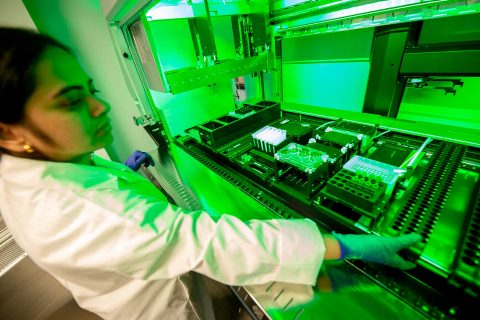Biology (MSc)
Program overview
The MSc in Biology is a research-intensive science program with a strong emphasis on innovative thinking. We look at a wide variety of biological sciences, including (1) cell/molecular biology, genomic and synthetic biology; as well as (2) ecology, evolution and conservation. Working closely with a faculty mentor, you will expand your knowledge of modern research methodologies while developing your disciplinary knowledge and analytical skills. You will gain an in-depth understanding of current scientific literature and the training, knowledge and techniques needed to become an effective and engaged scientist. Montreal's status as a major centre for applied research means you'll benefit from an academic ecosystem that includes four major universities and their research centres, federal and provincial agencies and a thriving private sector that frequently seeks partnerships with academic researchers.
Program structure
Degree Requirements
Fully-qualified candidates are required to complete a minimum of 45 credits.
Please see the Biology Courses page for course descriptions.
Biology MSc (45 credits)
| 9 | credits chosen from the following courses, or from the Biochemistry Courses list, in consultation with the candidate’s advisory committee:
|
| 36 | credits:
|
Biochemistry Courses
The following courses in Biochemistry may be taken for credit in the program: |
Admission requirements
Admission Requirements
- BSc degree or equivalent with specialization in biology with good standing (B average) from a recognized university.
- Proficiency in English. Applicants whose primary language is not English must demonstrate that their knowledge of English is sufficient to pursue graduate studies in their chosen field. Please refer to the English language proficiency page for further information on requirements and exemptions.
Application process
Application deadlines

FALL
February 1 (Canadian resident)
January 15 (International)

WINTER
September 1 (Canadian resident)
June 1 (International)

SUMMER
n/a
Priority will be given to complete applications submitted by the deadline. In some cases, programs may continue to accept applications as long as there is space available.
International students: Considering the waiting period involved in meeting the entry requirements to Canada and Quebec, we strongly encourage international applicants to apply early and submit supporting documents prior to the deadline.
Tuition & funding
Tuition and fees
Tuition and fees of the program may depend on your student status, among other key factors. Estimate these costs based on the most common situations.
Awards and funding
Funding packages are generally available for students in thesis-based programs. They come in the form of awards, teaching and research assistantships are offered at the time of admission to most students to allow them to focus on their research and studies. Research and thesis-based students are automatically considered for all entrance graduate awards when they apply to Concordia, provided they meet eligibility criteria. No separate application is required.
The Quebec and Canadian governments offer a number of competitive graduate scholarships. We encourage you to apply for these awards at the same time you are preparing your application.
Out-of-province students
Get $10,000 in special funding for thesis master's programs. Learn more
Other programs of interest

Gain broad-based knowledge in the study of genomics, proteomics, molecular genetics, protein biochemistry and bioinformatics. Prepare to enter the biotechnology and pharmaceutical industries or to pursue further graduate studies.
Department
Faculty


